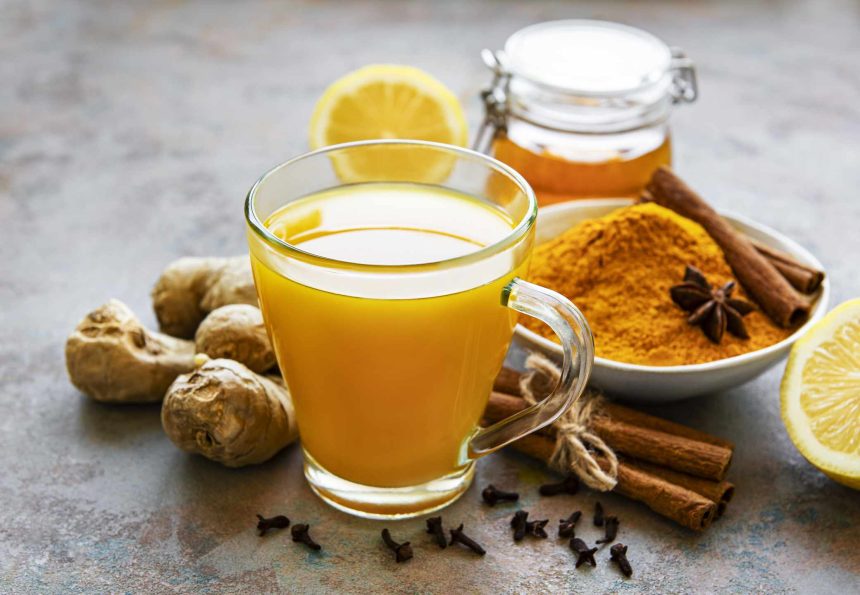Turmeric (Curcuma longa) is a spice used in traditional Chinese medicine and Ayurveda for centuries. Honey is a sweet substance made by bees that has many culinary and health uses.
Turmeric and honey both have compounds that can help reduce inflammation. Some studies suggest they may help with metabolism and weight loss. However, the evidence is limited.
Turmeric and honey may work by enhancing each other’s effects, but there is no evidence showing they are more effective together for weight loss. That said, the sweet taste of honey makes consuming the bitter turmeric easier.
Turmeric and honey may help with weight loss when used separately. However, no human studies have shown that combining them can help with weight loss.
Turmeric
Studies show that turmeric can help with weight loss. One research review concluded that supplementing with curcumin (turmeric’s active ingredient) significantly reduced body mass index (BMI), body weight, and waist circumference.
Supplements with more bioavailable (more easily absorbed by your body) curcumin led to greater weight and waist circumference reductions.
Although the study concluded that curcumin may help reduce body weight, the reduction was small—less than 1 kilogram over 4-18 weeks of taking supplements. The study methods also had potential problems that could have skewed the results.
Turmeric contains only about 2-9% curcumin. Most studies have focused on curcumin supplements, not on turmeric as a food. Because turmeric is low in curcumin and isn’t as well absorbed, it may be less effective.
Honey
Some studies show that honey can improve blood sugar and cholesterol, which can help weight loss and management.
However, other studies show either no or negative effects of honey on metabolic health. This is probably due to dosage, as honey has a high sugar content.
There is no evidence supporting that a turmeric and honey combination can help weight loss. There are also no recommended usage, doses, or duration. Be sure to consult your healthcare provider before using these supplements.
Turmeric contains less than 10% curcumin, making it unlikely to consume too much while using turmeric as a spice. However, you can consume too much curcumin or turmeric as a supplement.
Studies suggest a daily dose of 4,000-8,000 milligrams of curcumin is likely safe. Most studies looked at the effects of curcumin dosages ranging from 500-3,000 milligrams.
Some curcumin products are highly bioavailable and work at doses as low as 80 milligrams daily. Consuming more than the recommended dose could cause health problems.
Sugar is the limiting factor for honey. While some studies differentiate honey sugar from table sugar, the American Diabetes Association (ADA) recommends limiting all forms of added sugar to 15 grams for women and 36 grams for men.
Turmeric is a spice that can be very versatile, and honey is a sweetener with a wide range of aromas and flavors. You can consume turmeric and honey in various ways, including:
- Make a turmeric latte, also known as golden milk
- Make turmeric tea with honey
- Add honey or turmeric to dressings
- Add honey or turmeric to smoothies or grains such as oats and rice
- Marinate fish with turmeric
Turmeric is “generally recognized as safe” for its intended use. However, one study reported increased liver toxicity due to high doses of curcumin use.
Curcumin in turmeric is not well absorbed. Consuming too much curcumin through food sources is difficult, but overdoing it is easy with supplements. High-bioavailability types, combined with ingredients such as black pepper, can cause overdoses.
Turmeric can also cause gastrointestinal side effects like abdominal pain, constipation, and nausea. It may also cause vomiting, diarrhea, headaches, and rashes.
Turmeric may raise the risk of bleeding in people taking blood thinners, such as warfarin. Blood thinners and turmeric prevent blood clotting, so their combined effects can increase the risk of bleeding.
Honey is likely to be safe for most adults unless they have allergies.
Some dietary supplements may be ineffective or unsafe. The United States Food and Drug Administration (FDA) does not regulate food supplements before they are available for sale. Third-party-tested products guarantee safety by ensuring that no toxic substances are present and that ingredients and dosage are accurate.
More evidence is needed to gain a complete understanding of turmeric’s health benefits. While some studies do not report significant benefits, others suggest:
- Turmeric supplements can lower markers of inflammation in the blood.
- Turmeric may help improve oral mucositis (swelling and sores in the mouth) caused by certain head and neck cancer treatments, like radiation therapy.
- Researchers found that 1,000 milligrams of curcumin daily can help with rheumatoid arthritis, a condition characterized by joint inflammation that causes pain.
- Turmeric may help improve digestive health and symptoms in people with ulcerative colitis. This disease causes inflammation and damage to the cells in the digestive tract.
Honey is about 80% sugar. It doesn’t contain many vitamins or minerals (although more than granulated sugar). It does contain compounds that have antioxidant and anti-inflammatory effects. Some ways honey can support health:
- In a study, honey reduced pain and the need for pain meds in women healing from a cesarean section. However, it did not affect final wound healing compared to those who didn’t eat honey.
- Honey may reduce the severity of oral mucositis in patients with head and neck cancer. It also reduced treatment interruptions caused by this condition.
More evidence is needed on how honey types, dosages, and usage affect the body.
Both turmeric and honey may also boost metabolic health. Studies show that turmeric can help with weight loss, but it isn’t a substitute for a personalized weight loss diet and regular exercise.
We still don’t know how safe or effective turmeric and honey are for weight loss, whether used alone or together. Talk to a healthcare provider before taking any new supplements.






